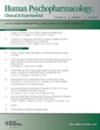Hypothalamic-pituitary-adrenal and autonomic response to psychological stress in abstinent alcohol use disorder individuals with and without depressive symptomatology
Abstract
Background
Stress and depression have each been associated with relapse risk. In clinical practice, chronic alcohol use is often accompanied by poor emotional and self-regulatory processes. Tonic and phasic changes in stress responsivity impact an individual's relapse risk to alcohol. A further complicating factor is the pervasive coexistence of depressive symptoms in those with Alcohol Use Disorder (AUD), where the contribution of depressive symptomatology to these processes is not well understood. Individuals with AUD (AD) (21 with and 12 without sub-clinical depressive symptoms) and 37 social drinking controls (16 with and 21 without sub-clinical depressive symptoms) as part of a more extensive study (Fox et al., 2019). All participants were exposed to two 5-min personalized guided imagery conditions (stress and neutral) in a randomized and counterbalanced order across consecutive days. Alcohol craving, negative mood, Stroop performance, and plasma measures (cortisol, adrenocorticotrophic hormone, and salivary alpha-amylase) were collected before and after imagery exposure.
Results
Elevations in autonomic response (heart rate) to imagery (stress and neutral) were observed as a function of drinking (in both depressed and non-depressed individuals with alcohol use disorder compared with depressed and non-depressed social drinkers). Conversely, suppressed cortisol following stress was observed as a function of depressive symptomatology across both drinking groups. Individuals with comorbid AD and depressive symptoms demonstrated attenuated Adrenocorticotropic Hormone and poor Stroop performance compared with the other groups, indicating an interactive effect between drinking and depression on pituitary and inhibitory systems.
Conclusion
Sub-clinical depressive pathophysiology may be distinct from drinking severity and may alter relapse-related stress adaptations during protracted abstinence from alcohol.

 求助内容:
求助内容: 应助结果提醒方式:
应助结果提醒方式:


